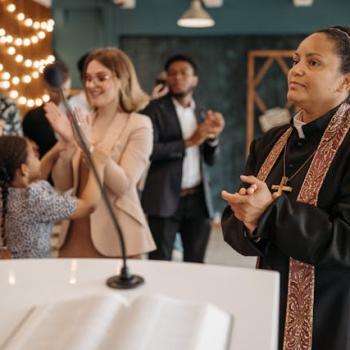Editors' Note: This article is part of the Patheos Public Square on Immigration and Refugees. Read other perspectives here.
Immigration policy is a conundrum for every nation, and the U.S.—long the top destination country for migrants worldwide—desperately needs effective policies to deal with millions of undocumented people within our borders and millions more streaming our way in the decades to come. A century ago, 9 out of 10 immigrants hailed from Europe. Today, the highest percentage comes from Mexico, with recent spikes from places as distinct as Syria and Central America.
To get to the heart of the immigration debate, look no further than the word polis, which is the root of the word politics and defined the ancient city-state of Greece. Plato wrote eloquently of the polis, believing that if the society could stay focused on the common good, guided by virtue, the polis would thrive. Yet, the city-state—then and now—was and is carefully circumscribed by haves and have-nots. In Plato's day, powerful cities were controlled by influential families (exclusively male landowners) who exerted their rule as they functioned as the human and political infrastructure for places like Athens and Sparta. These families understood that new citizens would have to be guided by the principles and beliefs of the families for society to flourish.
Indeed, the origin of the word society is "friend," a clear illustration of the friendship among powerful families that formed the basis for the polis. The long-standing, initiating question "Friend or foe?" became central to the function of Greek society, as migrating "barbarians" came with a new set of principles and beliefs that threatened to topple the city-state that families worked so hard to sustain. Some historians see the "golden age" of Greece as a model for America and other nations to follow, as a place guided by Plato's "four virtues" of a "just city": wisdom, courage, moderation, and justice. Others criticize Greek society as thinly veiled misogynistic oligarchy favoring the few, the endowed, the men.
America today seeks to maintain its "distinctive American values" (though we may have greater difficulty articulating exactly what those are than our ancient counterparts from Greece) while constructing immigration policy that aligns with those values and allows for assimilation that preserves them. As waves of U.S. immigrants from the 19th and 20th centuries arrived on our shores, they confronted residents—our own, perhaps more egalitarian, version of the polis—who feared each new group would bring their own values, diseases, and other threats that would strip America of its unique nature.
Today, Americans are evenly divided as to whether immigrants strengthen the country because of their hard work and talents (47%) or whether they are a burden on the U.S. because they take jobs, housing, and health care (46%). In addition, a growing number worry that immigrants could fracture our national identity, as we have seen occur in France and elsewhere. Not surprisingly, politics define attitudes about immigration, and presidential candidate Donald Trump has raised anxieties about immigration to a new level, calling for a ban on Muslim immigrants and a towering wall to protect us from ne'er-do-wells coming from the South.
As a Christian, I wonder how our traditional values—not all that different from Plato's famous four—might help shape future discussions and policy around immigration. Indeed, many experts have pointed to the fact that faith was a unifying principle that helped millions of immigrants assimilate effectively over the last century. Though Catholics, particularly Irish Catholics, were treated brutally by resident Protestants in many U.S. cities, the over-arching mandate to "love one another" challenged Americans of faith to go beyond traditional denominational and ethnic boundaries and welcome "strangers" from "every tribe and every tongue."
That same mandate challenges us today, and is balanced with our deep belief in the rule of law as we "give to Caesar what is Caesar" and mercy as we "give to God what is God's." Many of the undocumented living within our borders and many coming to us from Mexico, the Philippines, Central America, and elsewhere, share our values of faith, family, and freedom. We will be a richer nation in every sense of the word if we treat those who are here with justice and mercy, and formulate laws that respect the need for secure borders and our ongoing determination to be a refuge for those willing to take our values as their own, and become members of the American polis of the 21st century.
America's immigrants are not, for the most part, the marauding barbarians Athenians feared. The golden age was tarnished by the dross of selfish men who were more committed to protecting their interests than perpetuating a just society. Can Christians help lead us to a new place of understanding the need to welcome strangers and sustain a nation predicated upon just laws? Socrates was willing to choose hemlock over banishment because of his love for his nation. He also advocated for a polis that placed the common good over individual desires. Perhaps men and women of faith can use elements of his model to forge an America unified by foundational values that bring justice and hope to all.
8/10/2016 4:00:00 AM




